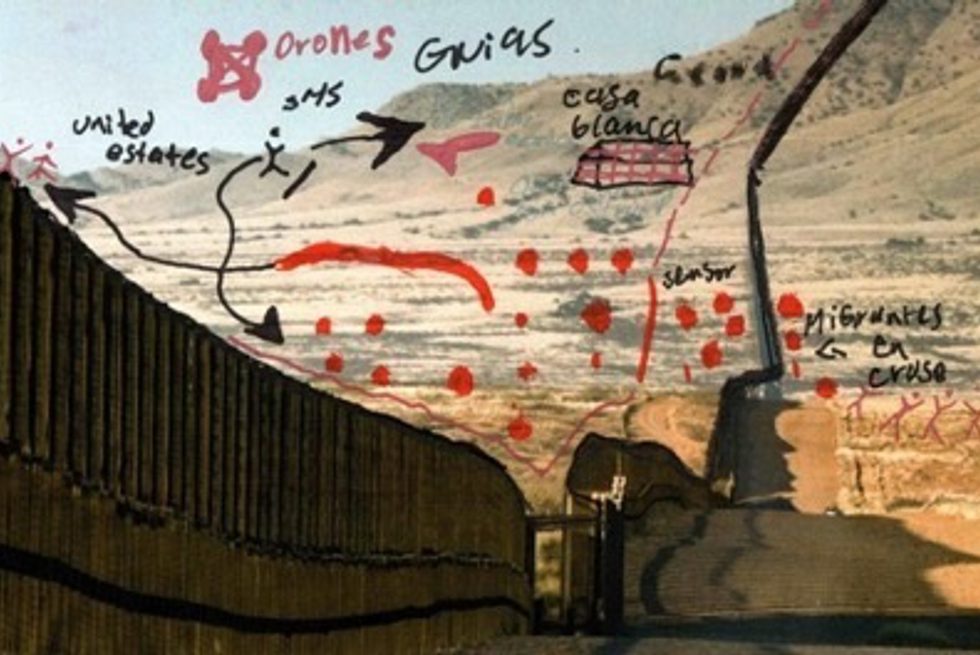The Objectification of Suffering as Policy
From the Series: The Damage Wrought: Immigration Before, Under, and After Trump
From the Series: The Damage Wrought: Immigration Before, Under, and After Trump

Mothers who were detained at the T. Don Hutto Residential Center after being separated from their children during the Trump administration’s zero tolerance policy told and retold the stories of when their children were taken away. I was one of the volunteers in a visitation program organized by Grassroots Leadership, an NGO in Austin, Texas, that assisted these distraught mothers document their separation stories. By saying their children’s names and describing them, the mothers hoped we could find a way to reunite them. As asylum seekers in detention, these mothers knew that their testimonies were a powerful weapon to mobilize the media and the general public.
Following Lia García (2018), who describes writing about one’s own life as a political act that engages a living network of emotions, feelings, and experiences, the women’s writings are political acts of defiance. As they describe their painful decisions to leave their home countries in Central America, they impugn the state for not protecting them from various forms of patriarchal, structural, and social violence. One mother wrote:
My country does nothing to protect its people, and many people there die in gang violence. El Salvador is infested with these gangs like MS and 18. I’m a mother and father for my son and I couldn’t find another way out, so I fled with my son to the US because in El Salvador they will look for you until they find you. I did not know about the new law that would separate children from their mothers and as a mother I can tell you this is the hardest and most cruel thing a mother can feel.
The women’s testimonies were translated into English and posted on the Grassroots Leadership web page, which became a source for numerous media articles.
Some, like Antonia, wrote to their children:
I want you to know that it hurts me so much that we are separated, but I’m asking God every day for us to be together again soon. I miss you so much my love. I want to see you and hold you, but I am fighting for you and soon we will be together and we will never be separated again. I am going to take care of you and protect you. I love you so much my dear. See you soon. I love you my gordo precioso.
Others narrated how the zero tolerance policy assaulted their humanity and dignity:
They took my children from me at the ice box [hielera] and said it would just be for a short period, that afterwards they would reunite them with me, but it wasn’t true. I was then transferred to McAllen, the dog pound, as they call it. I was there for 7 days without showering or brushing my teeth. I ate bread with cold cut processed meat and a juice for every meal. I was surrounded by a lot of mothers crying for their children. Many of them passed out when they heard we would get deported without our children, that they would stay here. There were many in each cell passing out over and over and the officers just laughed.
Another “family detention center” in Texas is located in Dilley, just a few miles away from a World War II–era Japanese American internment camp in south Texas, a grotesque reminder of the long history of the U.S. government brutalizing those perceived as outside the white nation-state (Re Cruz 2017, 2018). As in Hutto, women detained in Dilley also wrote letters to the public about their dehumanizing treatment. Luciana wrote:
After three days in the “icebox” I was transferred to the “dog pound” where we were really treated worse than animals. We would reach our hands out for a cracker and they would throw it. They called us pigs and would kick us to make us get up in the morning and at night they would raise the air conditioning. I was there 6 days. Then I was transferred to a federal maximum-security prison in Washington, they handcuffed our feet and hands and put a chain around our waist when we arrived there. I was there for a month and when I returned to my cell after receiving a visit from a lawyer I had to take off my clothes for the officials to examine me.
These testimonials helped mobilize outrage on a national and international level and also were used by pro bono legal assistants to support women’s asylum cases. In June 2018, a federal Judge, Dana M. Sabraw of California, ruled for the immediate reunification of migrant parents with their children. At least 4,300 families had been separated prior to Sabraw’s ruling. According to a report released by the Department of Homeland Security’s Inspector General, the Trump Administration had expected that nearly 26,000 families would be separated by September of 2018. This means that the detained mothers’ letters contributed to preventing more than 20,000 families from being separated. These mothers turned their visceral anger and deep suffering into an affective and effective form of protest.
García, Lia. 2018. “Escribir con las propias manos / La escritura trans como detonadora de memoria.” Las Reinas Chulas, Cabaret y Derechos Humanos (website), February 1.
Re Cruz, Alicia. 2017. “Antropología de Emergencia en el trabajo con menores y mujeres centroamericanas en busca de asilo.” Astrolabio: Revista Internactional de Filosofia, Universidad de Barcelona 19: 207.
———. 2018. “Cuando fronteras y testimonios se confabulan para el surgimiento de una Antropología de Emergencia.” In Género, migraciones y derechos humanos, edited by Almudena Cortés Cortes and Josefina Manjarrez Rosas, 205–26. Barcelona: Bellaterra.